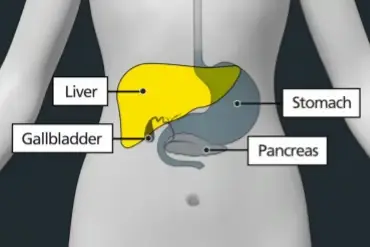Liver cancer (also called primary liver cancer) is a cancer that starts in the liver. A cancer that starts somewhere else in the body and spreads to the liver is called secondary liver cancer.
The liver is a large organ at the top right side of your abdomen. It helps you digest your food, maintain blood glucose levels, provides proteins to help your blood to clot and removes toxins.

Often liver cancer may not cause any symptoms, or they might be hard to spot.
Symptoms of liver cancer can include:
- jaundice - the whites of the eyes or the skin turn yellow
- loss of appetite or losing weight without trying to
- a swollen or painful tummy
- feeling or being sick
- feeling generally unwell or having symptoms like flu
The symptoms are the same for primary liver cancer (if the liver cancer starts in the liver) and secondary liver cancer (when it spreads from another part of the body).
The most common type of primary liver cancer is hepatocellular carcinoma (HCC), sometimes called hepatoma. This type of liver cancer develops from the main liver cells called hepatocytes. It's more common in people with cirrhosis, which is the scarring of the liver due to previous damage. The damage could be caused by the hepatitis B or C virus, or long-term alcohol drinking above the recommended levels, or non-alcoholic fatty liver disease. Therefore, you may have regular tests to check your liver. These tests may find if you develop cancer, before you have any symptoms.
Other types of primary liver cancer include:
- fibrolamellar carcinoma
- bile duct cancer (cholangiocarcinoma)
- angiosarcoma
- hepatoblastoma
Treatment for liver cancer at CUH
The treatment you have depends on several factors, which include:
- the type and size of the cancer
- where the cancer is located in the liver
- if it is primary or secondary liver cancer
- your general health
- whether you have long-term liver disease
A team of specialists at CUH will meet to discuss your condition and to make a recommendation about the best possible treatment for you.
You, along with your clinician, will then discuss your treatment recommendations at the clinic appointment and decide on the right treatment plan for you. Your clinician will explain the different treatment options and possible side effects.
Liver cancer is often treatable, but can be difficult to treat.
The treatment for liver cancer can include:
- surgery
- tumour ablation
- embolisation
- systemic therapy
- radiotherapy
You may be able to have surgery to remove cancer, if your liver cancer is found early, is small and it has not spread. Surgery will remove part or all of your liver. If all liver is removed, you will need a liver transplant to replace it with a donated one. Recovery from surgery to treat liver cancer can take a long time.
At times, you may require more than one treatment or a combination of different treatments to give the best chance of long-term cure. For some patients, treatment may be given with the aim of curing the cancer. For others, to help control the cancer, prolong life and improve symptoms. Your clinical team will discuss with you what to expect.
Read more about the different types of treatment on our website.

